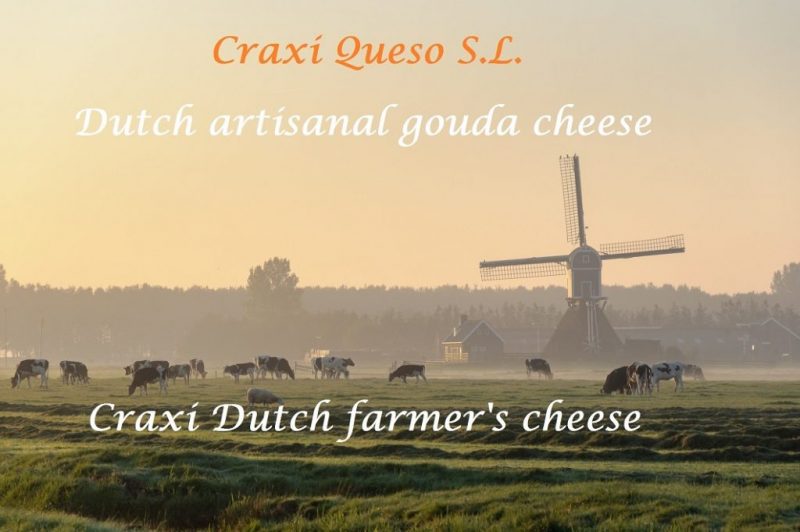Craxi Gouda farm cheese faq page.

Craxi Dutch artisanal Gouda cheese Faq page.
Frequently Asked Questions.
- What are those white dots in old cheese?
- Is it safe to eat Gouda cheese during pregnancy?
- How do I store Gouda cheese?
- How long can I keep Gouda cheese?
- Can you still eat Gouda cheese if it has mould on it?
- How much milk is needed to make 1 kilo of cheese?
- What does the number 48+ on Gouda cheese mean?
- Does old cheese contain more fat than young cheese?
- Why is a Gouda cheese shaped like a wheel?
- Can you still eat cheese with lactose intolerance?
- Can I eat your cheese if I am allergic to cow’s milk?
Below is an overview of the answers to the most frequently asked questions we have received. If you have a question and cannot find the answer here, you can always contact us via the contact form on the website.
Faq and answers about our artisanal Gouda cheese.
1 – Faq crystals in cheese.
What are those little white crystals in aged gouda, is it salt?
These little crunchy whitish crystals in your aged cheese are not salt crystals. The white dots of your aged cheese are made up of protein. This protein is converted into amino acid and calcium salt during the ripening process and this causes crystals to form in the cheese. The protein crystals form after 8-10 months of ripening.
2 – Faq artisanal gouda cheese & pregnancy.
Can I eat artisan gouda during my pregnancy?
Our Dutch farmhouse cheese is indeed made from raw, unpasteurised milk. But because it is a hard cheese with low moisture, listeria bacteria cannot survive or grow in it. Therefore, the artisanal Gouda cheese we make is safe to eat during pregnancy. This also applies to Gouda cheese which is made in a cheese factory. They are made from pasteurised milk and all cheeses made from pasteurised milk are safe to eat.
3 – Faq how to store Gouda cheese.
What is the best way to store gouda at home?
Dutch Gouda cheese is a cheese that keeps very well. At home, you keep the cheese in the refrigerator. Take it out of the fridge at least 15 minutes before using it. Storage tips : Use our cheese paper as packaging that has a layer of cling film on the inside. This foil layer ensures that the cheese cannot dry out and keeps your cheese the smoothest and tastiest. If no cheese paper is available a simple piece of cling film will suffice. Do you have a dry cellar at home? A cellar is almost always at 15 degrees; the perfect temperature for storing Gouda cheese.
4 – Faq shelf life of gouda cheese.
How long can artisanal gouda be kept in the refrigerator?
The cheese is packed in special cheese paper, but can also be vacuum packed if desired. As a general rule, vacuum-packed artisan gouda cheese can be kept in the refrigerator for 4 months. When the vacuum pack is opened, it can be kept in the refrigerator for about 2 weeks in the special cheese paper. Take the cheese out of the fridge 15 minutes before use to enjoy the full flavour of the cheese.
5 – Faq mould & gouda cheese.
What should I do if there is mould in my cheese?
Of course, no mould should grow on Gouda cheese. However, this can happen if the cheese is not stored properly or is left to stand for too long. Not all moulds pose a risk. The mould culture that forms on cheese is not harmful and is a different mould culture from that on vegetables, fruit, or bread, which is harmful! In general, mould does not spread quickly in hard cheeses such as Gouda farm cheese. so do not throw the cheese in the bin, but you can cut off the mouldy part. Cut off at least 2.5 centimeters around and under the mouldy spot. Make sure that the knife stays out of the mould so that it does not contaminate other parts of the cheese.
6 – Faq milk required for 1 kg Gouda.
What is the amount of milk required to make 1 kg of cheese?
One kilo of cheese requires about 10 litres of milk. We make large cheese wheels of 12 kg and small cheese wheels of 1 kg. A cow gives on average 25 litres of milk per day. This means that for a cheese wheel of 12 kilos the milk of approximately 5 cows (120 litres) is needed.
7 – Faq what does 48+ mean?
What do numbers like 30+ 40+ and 48+ mean on cheese?
The indication 48+ like our farmhouse gouda indicates the fat content in the dry matter. For example, 48+ cheese has a fat content of 48% of the dry matter. The higher the number, the fatter the cheese. If you buy 100 grams of young cheese (4 weeks matured), 40 grams of that cheese is water. That leaves 60 grams of cheese. If it says 48+ on the cheese, this means that the remaining 60 grams of cheese consist of 48% fat. So you have to calculate a bit further: 48% of those 60 grams is 29 grams.
8 – Faq more fat in old cheese.
Does old cheese contain more fat than young cheese?
The most important difference between old and young cheese is that due to ripening the cheese loses moisture. Other nutrients however remain present. Old cheese has been on the shelf for at least ten months to mature, young cheese only for about four weeks. As a cheese gets older, it loses moisture and becomes drier. Old cheese contains slightly more fat than young cheese, approximately 10%. This is because there is less moisture (water) in old cheese. This moisture does not contain fat, but the dry substance does.
9 – Faq shape of gouda cheese.
Why is Gouda cheese shaped like a wheel?
The cheese is shaped like a wheel because this is the ideal shape for the cheese to mature. When the curd (the coagulated milk mixture) has been moulded into shape and has left the brine bath and gone into storage, the ripening process begins. During ripening, the cheese loses moisture, which causes the curd to form. The ripening process must be as uniform as possible. For this reason, the cheese is turned regularly. If a square cheese were used, the corners would dry out much faster than the center of the cheese, which would give the corners a different taste. The round model ensures that the moisture is extracted from all points of the cheese at the same time, giving the cheese a more uniform taste and structure.
10 – Faq lactose intolerance.
I have lactose intolerance. Which cheeses are safe to eat?
The degree of lactose intolerance varies from person to person. Most people have no complaints when they eat a cheese that has less than 1 gram of lactose per 100 grams of cheese. But one person can tolerate much less, and another much more. Therefore, it is important to get an idea of what you can and cannot eat. Hard cheeses contain little moisture and therefore less lactose. In addition, lactose is converted into lactic acid during the ripening process. In general, ripened, hard cheeses are usually the best choice. The fact is that the lactose with which the cheese is made ‘nibbles’ away at the milk sugar during the ripening process. The longer the cheese has matured, the greater the chance that you can eat it! What’s more: in most old cheeses there is no trace of lactose. These cheeses are practically lactose-free (less than 0.1 grams per 100 grams of cheese). Craxi gouda – All types. Manchego – All types. Pecorino – All types. Parmesan – All types. Provolone – All types. Emmental – All types.
11 – Faq allergy.
I am allergic to cow’s milk, can I eat your farmhouse cheese?
Unfortunately, no. Our cheese is made from raw cow’s milk and contains cow’s milk proteins to which an allergic reaction can occur. It is best not to eat cheese and dairy products, but to choose soy-based products instead. Intolerant vs. allergic The difference between an allergy and an intolerance lies in the involvement of your immune system. An intolerance is caused purely by your digestive system, but in the case of an allergy, your immune system is also involved. Also, in the case of an intolerance, the symptoms often appear somewhat later and are generally experienced as milder than in the case of an allergy.
If you have any questions, please contact us via the contact form on the website.

Craxi artisan Dutch Gouda cheese shop in Malaga, address cheese shop Mercado Merced, Stall 14, Calle Merced, 4, 29012 Malaga, Spain.
How to Spot the Real Dutch Gouda?
Find us on Facebook.